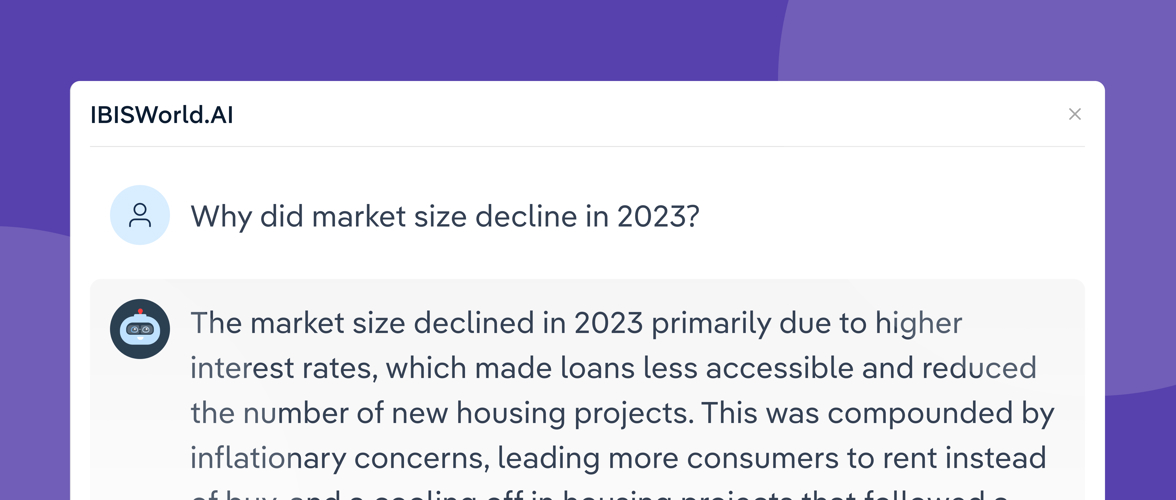What is Industry Information?
Industry information is the collection of economic, market and (sometimes) political factors that influence an industry, typically presented in a report format. An industry information resource provides you with access to a suite of standardized industry reports that provide the data and analysis you need to make knowledgeable business decisions. (You should also be able to use your industry information resource to help you develop your business plan.)
To understand the importance of industry information, we must first understand the dynamics of a company’s business environment.
Putting a Company in Context
Industry information provides the data and analysis businesses need to put their company (and their supplier’s or client’s companies) in context.

The first significant influence on a company is the industry in which it operates. The industry is a company’s all-encompassing “environment” and it is imperative that organizations and managers understand their industry to be successful. You must be knowledgeable on its major players (i.e. your competitors, suppliers and/or clients), the barriers to entry, the industry life cycle, the trends within the largest buying markets and the performance of the products and services, among other things. For example, a CEO that is debating whether to acquire a company can use industry information to calculate the company’s market share to get an idea of its competitiveness within the industry prior to the acquisition.
The next level that puts a company in context is the operating environments, which include finance, government, the marketplace, purchases, labor and services. Changes within the operating environments directly influence the industry and, in turn, the company. Companies cannot control these factors (i.e. change in government regulations, exchange rates, interest rates, etc.), but they can manage them. These operating environments can be a source of revenue or a cost center for companies. Which it is depends on how well a company relates to or reacts to the operating environments. For example, a company looking to expand their operations into an industry outside of their expertise can use industry information to conduct a SWOT analysis. Conducting a SWOT analysis provides the company with insight into the key factors influencing the industry, helping them to develop business strategies to best leverage their resources and carve out their own niche within the industry.
The economy overarches the industry, its operating environments and the company. Changes in the economy have an impact on all the environments via fluctuation in the consumer price index, GDP growth, capital expenditure, etc. Fluctuation in the economy, combined with trends occurring in the operating environments and industry, make industry information ever important because businesses can use the information to gain a better understanding of their industry’s life cycle and unlock a wealth of knowledge. Understanding the industry’s life cycle will provide businesses with greater insight into the industry’s product strategy, growth prospects, opportunities and challenges, and its supply chain.
The remaining influential environments, such as natural resources and the world, do not have a direct influence on a company’s revenue, cost or profits, but can indirectly influence those results via the operating environments (e.g. weather, war, world prices, social attitudes, etc.).
The takeaway here should be that no company, and consequently no industry, operates in isolation. It is all interconnected and the purpose of industry information is to provide you with credible data and analysis to connect the dots.
Why Industry Information Matters
“No industry operates in isolation; it is part of a chain of suppliers and customers each with different operating conditions, threats and opportunities…” Phil Ruthven, Founder and Director of IBISWorld
Let’s look at this assertion in action. Consider a drop in the price of crude oil. Let’s look at which industries would be affected:

There are 28 industries directly impacted (not all pictured here) by a drop in crude oil prices! This is illustrative of just how a change in one driver can have a ripple effect, affecting many different industries from supply chain to supply chain. Industry information will inform you which industries are impacted and how. Moreover, depending on the resource, your industry information should also provide you with access to financial ratios to benchmark company performance when such dramatic events occur. Businesses can use these financial ratios to assess red flags and areas of concern.
Granularity is Key
Another reason why industry information is important is because industries that operate in the same sector can behave differently. Take the manufacturing sector, for example. Of the 194 industries that operate in the manufacturing sector in the US, just 45 are performing above the national average. One industry is performing at the national average, while a whopping 148 industries are performing below the national average. Some extreme outliers are the wind turbine manufacturing industry and the apparel knitting industry.
An industry information resource that provides such granularity will allow you to pinpoint those industries most suitable for your needs. In addition, you can also use industry research to conduct Porter’s Five Forces analysis to develop business strategies to increase your competitiveness within the industry and determine its attractiveness in terms of its profitability.
How YOU Can Use Industry Research
Now it’s time to understand how you can use industry information, no matter which industry you operate or are interested in. However, you must also determine if you need industry information and you’ll know if you meet any of the following criteria.
You’re Time Poor
You need the right answers NOW and you know it’s not economical for you (or your team) to gather the information yourself, especially when you’re dealing with many different industries.
You’re Exposed to A LOT of Industries
You consistently deal directly and/or indirectly with many different industries. Because of this, you need access to lots of information.
You Have a Strategic Mindset
You’re focused on growing the business – be it new markets, people, or departments. Or, you’re focused on cost reduction, but you want to do it strategically. You may be focused on mitigating risk and you understand the importance of strategically managing risk.
You Need This Type of Information Throughout the Year
You have a continual need for research and information, and you need that information from a credible, objective provider.
You Understand the Power of Information
You’ve read this article. You’re on board with the benefits of industry information, you know you need it and, you’re ready to learn how to apply it.
Applying Industry Information to Your Role
Industry Information and Accounting
The accounting industry requires industry information to provide its finance-related services, specifically auditing, corporate finance and advisory.
- Auditors need industry information to plan the areas of focus for their audits. (According to International Standard on Auditing (ISA 300), market research is required to do so.)
- Corporate Finance uses industry information to better understand the strengths and weaknesses of industries to work on buy-side or sell-side transactions.
- Business Advisors leverage industry information to increase their credibility and knowledge of their client’s business and the industry they operate in.
Industry information helps accountants:
- Be more efficient
- Reduce research time
- Ensure the firm is using the latest and most relevant information
*Keep in mind: Your industry information resource should be flexible enough to suit firms big, small and any size in between.
Industry Information and Banking & Commercial Finance
The banking and finance industries provide loans and other types of finance to businesses for both ongoing needs and specific projects.
- BD and Account Managers use industry information to increase their credibility by being experts on their client’s businesses. This allows BD and Account Managers to win more business and keep them for longer.
- Credit teams and underwriters need access to risk scores and analysis to make better lending decisions. Industry information that provides insight on the level of type of risk experienced by an industry is crucial to making sound lending decisions.
- Portfolio managers and strategists use industry information to assess the changing risk profile of their entire loan book.
Industry information helps banking and commercial finance:
- By complementing information from credit rating agencies
- Providing up-to-date information to foster a closer relationship with clients
*Keep in mind: The SME lending space is becoming increasingly competitive, so having access to industry information is one of your unique points of difference to your clients.
Industry Information and Business Valuation
The business valuation industry determines the value of all types of businesses, which is used by banks when determining loans, corporate finances for transactions and private equity for investments.
- Business valuation firms use industry information to perform a market analysis for the businesses they’re interested in.
- Business valuation firms may also choose to specialize in certain industries or sectors and use industry information as the foundation of their specialization.
Industry information helps business valuation firms:
- Stay up-to-date on information to create credible and factual market analyses
*Keep in mind: Banks are seeking differentiation, so access to industry information reaffirms your value proposition.
Industry Information and Consultants
Consultants share their expertise and knowledge to help clients improve their performance, achieve their strategies and solve problems.
- Consultants use industry information to cut hours from project research and gain an immediate understanding of the client’s industry conditions, risk and outlook.
Industry information helps consultants:
- Understand the client’s product
- Business development strategy
- Benchmarking the client
*Keep in mind: Consulting firms vary in size; thus, it is important to ensure that the industry information resource has flexible packages and prices to suit firms of all sizes.
Industry Information and Corporate Finance (M&A)
The corporate finance industry brokers transactions, such as buying, selling, IPOs, MBOs, MBIs, raising capital and restructuring capital, of businesses for business owners.
- When buying, corporate financiers (CF) use industry information to understand a business’s weak points. CF can also use the obtained industry information during negotiations to help drive down prices and garner the best deal.
- When selling, a CF uses the information to understand the strong points of the business to negotiate the price up. Industry information is also used in prospectuses and information memorandums.
Industry information helps corporate finance:
- By providing a high-level overview to help with first-stage research so juniors can use a more trusted, credible and reliable source than Google.
- By providing information on industries in a range of countries
*Keep in mind: Access to industry information increases your ability, and therefore credibility, to speak knowledgeably on many industries without spending hours of research.
Industry Information and Insurance
Insurance agencies protect the value of property against loss by assessing the probability that a loss will occur and that they must cover that cost.
- Insurance agencies use industry information to assess risk. For example, when insuring a business, an insurance agency will need to know the likeliness that the business will fail.
- Business development department will need access to industry information if they’re selling directly to end clients. Having access will provide them with greater insight into the client’s business and problems and increase their credibility and the strength of their discussions and pitches.
- The strategists within the organization will use industry information to determine the types of businesses to focus on.
Industry information helps insurance:
- Underwriters find the relevant and up-to-date information they need quickly
- Conduct effective due diligence and overall monitoring of the risks for policies and investment portfolios
*Keep in mind: Insurance agencies find industry information particularly useful because it can cater to nearly every department in the organization from the COO to underwriting to business development to strategy.
Industry Information and Law Firms
Law firms ensure the legality of commercial transactions and advise corporations on legal rights and duties. As a result, law firms must have knowledge of contract law, tax law, accounting, securities law, bankruptcy, intellectual property rights, licensing, zoning laws, and laws specific to the corporations they work with.
- Law firms can use industry information to help direct partners and marketing to industries that are facing change and may need legal services.
- It also helps marketing tailor packages to win new clients and maintain current clients. With access to facts and figures specific to the client’s industry, access to industry information lends more credibility to the attorney in the eyes of the client.
Industry information helps law firms:
- Develop firm strategy
- Strengthen client relationships
- Create stronger proposals, meet and greets, and client-focused research
*Keep in mind: Law firms need to operate as a trusted, objective, unbiased partner to their clients. As a result, law firms need access to an industry information resource that is unbiased and credible.
Industry Information and Private Equity
Private equity firms use investor money to buy a controlling stake in businesses, typically with the aim to sell at a profit later.
- Private equity firms can use industry information during the origination process to help identify the right industries and choose the right businesses within those industries. Private equity firms can also reference industry information when they’re ready to sell a business to ensure the they are selling at a good time.
Industry information helps private equity firms:
- Allows the firm to be selective for inbound origination
- Help the firm make the right initial choices without needing a deep level of analysis
*Keep in mind: Because private equity firms deal in several industries, it is important that your industry information resource has the breadth of collection to match.
Industry Information and Procurement
Procurement is responsible for purchasing the direct and indirect goods and services for that a business uses.
- Procurement professionals use industry information to benchmark suppliers against the industry for their relative strength, viability and negotiating position.
- Procurement also uses industry information to conduct supplier assessment and review and to increase their negotiation power by better understanding their supplier’s industries.
Industry information helps procurement:
- By integrating into procurement processes, such as Porter’s Five Forces analysis, category management, etc.
*Keep in mind: Industry information is at the industry-level, not the product or service level. Companies like ProcurementIQ provide procurement market intelligence at the product and service level.
Industry Information and Sales & Marketing
Sales and marketing are responsible, in their respective ways, for generating new business for the company.
- Sales use industry information to engage with prospects with relevant and meaningful dialogue, which allows the sales professional to win trust and business by being knowledgeable of the client’s industry and challenges they’re currently facing.
- The information also helps sales professionals make stronger pitches and proposals. As for marketers, industry information is used to identify and understand target markets, which ensures that marketing spend and effort is allocated effectively.
Industry information help sales and marketing:
- Stay up-to-date on different sectors and different businesses
- Gives more credibility to sales pitches and marketing campaigns
*Keep in mind: Sales and marketing teams are unique. Be sure to find an industry information resource that is flexible enough to meet your needs.
Industry Information and Universities
Universities and academic institutions provide learning and qualifications in a range of subjects.
- Business schools use industry information as one of their many sources of market research, providing access to the faculty and, often, the entire student body.
- Academic staff often make use of industry information to corroborate and substantiate their academic work, using industry information for lesson preparation and refer students to it for coursework.
Industry information helps universities:
- Provide staff and students with access to the latest industry information
- Provides students with access to a resource widely used in the business world, effectively helping to prepare them for their career
*Keep in mind: When conducting research on the most appropriate industry information resource, ensure that breadth of coverage is a non-negotiable factor in your purchasing decision.
IBISWorld Industry Research
No matter which industry you operate in, industry information is the resource you need to make better informed business decisions, giving you the strategic and competitive upper hand in the marketplace. While there are many industry research resources, only IBISWorld has the breadth of collection needed to gain a complete picture of the operating environments across different industries. Contact us today to learn more.









